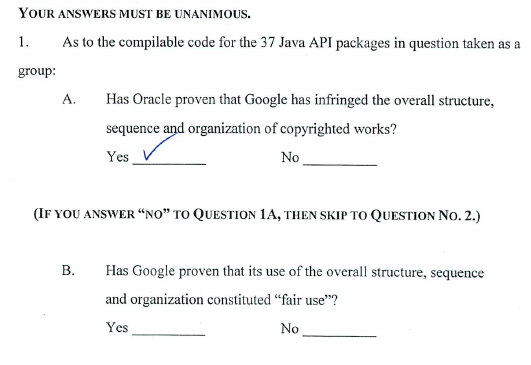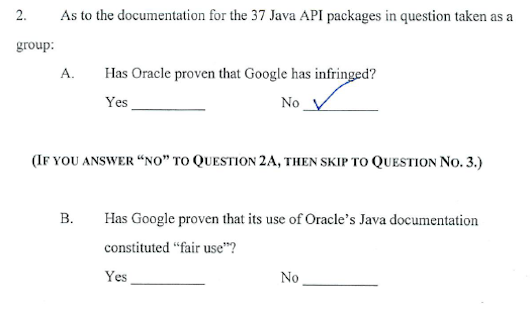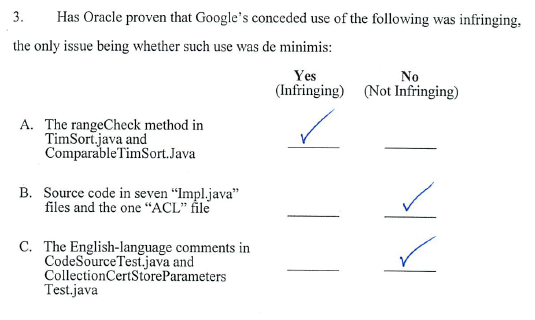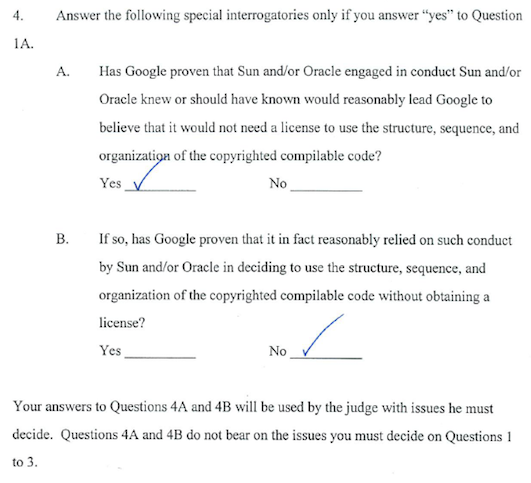Oracle vs Google: Jury Delivers Verdict
Today at federal court in San Francisco, 12 jurors announced their verdict. The jury pleaded guilty to the Internet giant, but only partially: on two of the four counts of accusation, Google was found not guilty.
The jury unanimously agreed that Google borrowed the structure and organization of the Java language from Oracle.
Also, Google was found guilty of violating Oracle’s copyright on nine lines of Java source code that are / were in Android.
The trial is not over yet: the court is to assess the losses incurred by Oracle as a result of violations by Google.
')
Let me remind you that Oracle requires about $ 1 billion in compensation.
The rangeCheck method from the file array.java , which according to the court was borrowed, lines 788 to 802:
Excerpt from the jury's decision:
1-A) If we consider that the API may be copied (the decision on this is a separate legal procedure and has not yet been made), did Google violate the copyright on the 37 JAVA API package - YES.
1-B) If 1a YES, was there a fair use copyright violation - the decision was not made.

2-A) Whether the copyright on the documentation for the 37 JAVA API package has been violated - NO.
2-B) The second part of the question is ignored, since 2-A is NO.

3) Is it proven that Google took the code from:
3-A) RangeCheck Functions - YES.
3-B) Code in 7 files “Impl.java” and in one “ACL” file - NO.
3-C) Comments in English in some files are NO.
(This part requires clarification. Initially, Oracle made claims for ~ 100k lines of code, but only some of them were considered in court. Detailed description in the document: [ link ])

4-A) Did Google prove that Sun / Oracle knew or might have known that some of their actions made it clear to Google that licensing is not required - YES.
4-B) Did Google prove that he actually acted on the basis of these actions of Sana / Orakla in his decision to use copyrighted materials without a license - NO.

For detailed information, thank you habrachelovek StasTs .
Related Links:
Bloomberg: [ link ]
Verge: [ link ]
Reuters: [ link ]
CNet: [ link ]
Details on the case at Habré: [ link ]
The jury unanimously agreed that Google borrowed the structure and organization of the Java language from Oracle.
Also, Google was found guilty of violating Oracle’s copyright on nine lines of Java source code that are / were in Android.
The trial is not over yet: the court is to assess the losses incurred by Oracle as a result of violations by Google.
')
Let me remind you that Oracle requires about $ 1 billion in compensation.
The rangeCheck method from the file array.java , which according to the court was borrowed, lines 788 to 802:
/** * Checks that {@code fromIndex} and {@code toIndex} are in * the range and throws an appropriate exception, if they aren't. */ private static void rangeCheck(int length, int fromIndex, int toIndex) { if (fromIndex > toIndex) { throw new IllegalArgumentException( "fromIndex(" + fromIndex + ") > toIndex(" + toIndex + ")"); } if (fromIndex < 0) { throw new ArrayIndexOutOfBoundsException(fromIndex); } if (toIndex > length) { throw new ArrayIndexOutOfBoundsException(toIndex); } } Excerpt from the jury's decision:
1-A) If we consider that the API may be copied (the decision on this is a separate legal procedure and has not yet been made), did Google violate the copyright on the 37 JAVA API package - YES.
1-B) If 1a YES, was there a fair use copyright violation - the decision was not made.

2-A) Whether the copyright on the documentation for the 37 JAVA API package has been violated - NO.
2-B) The second part of the question is ignored, since 2-A is NO.

3) Is it proven that Google took the code from:
3-A) RangeCheck Functions - YES.
3-B) Code in 7 files “Impl.java” and in one “ACL” file - NO.
3-C) Comments in English in some files are NO.
(This part requires clarification. Initially, Oracle made claims for ~ 100k lines of code, but only some of them were considered in court. Detailed description in the document: [ link ])

4-A) Did Google prove that Sun / Oracle knew or might have known that some of their actions made it clear to Google that licensing is not required - YES.
4-B) Did Google prove that he actually acted on the basis of these actions of Sana / Orakla in his decision to use copyrighted materials without a license - NO.

For detailed information, thank you habrachelovek StasTs .
Related Links:
Bloomberg: [ link ]
Verge: [ link ]
Reuters: [ link ]
CNet: [ link ]
Details on the case at Habré: [ link ]
Source: https://habr.com/ru/post/143447/
All Articles